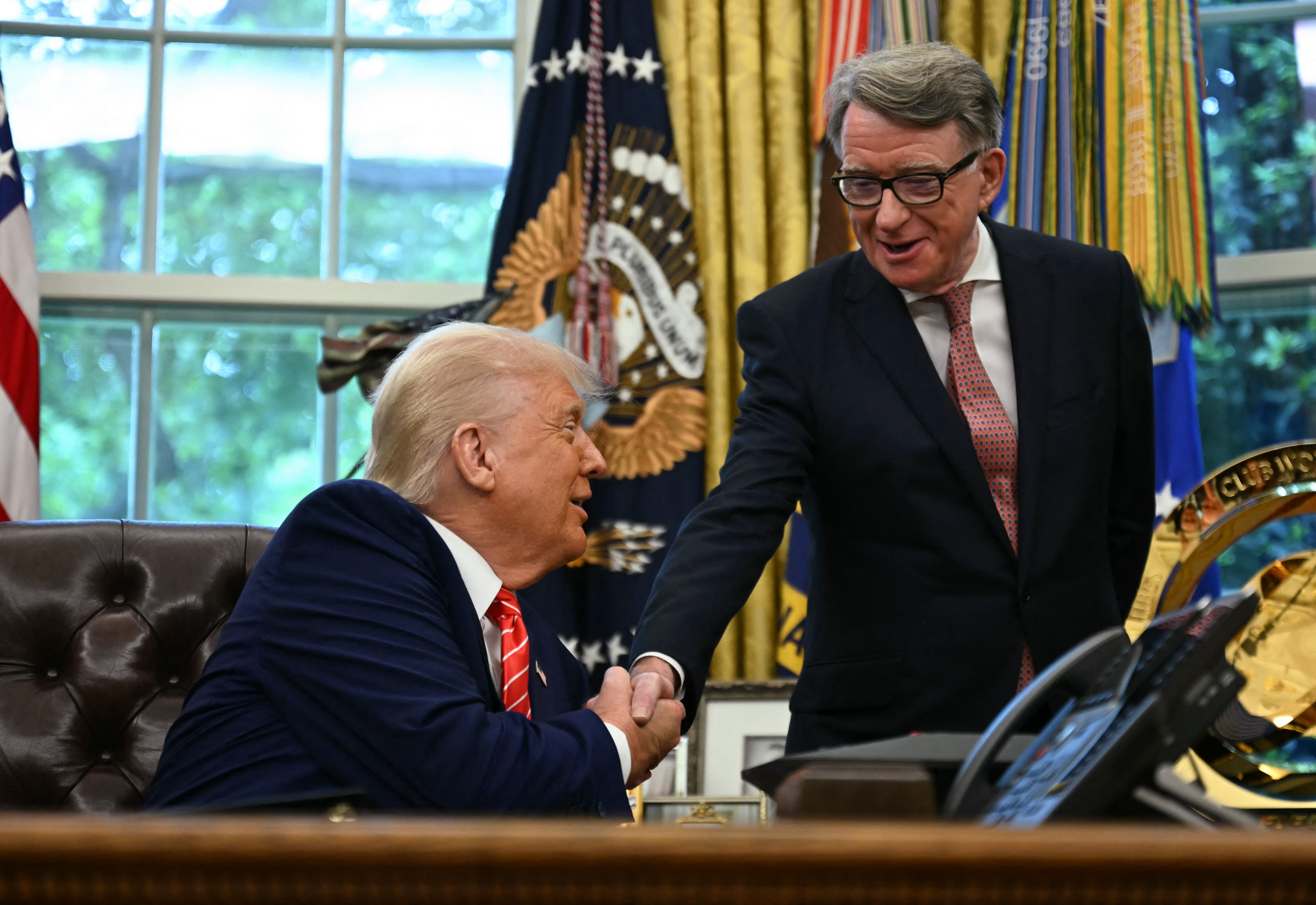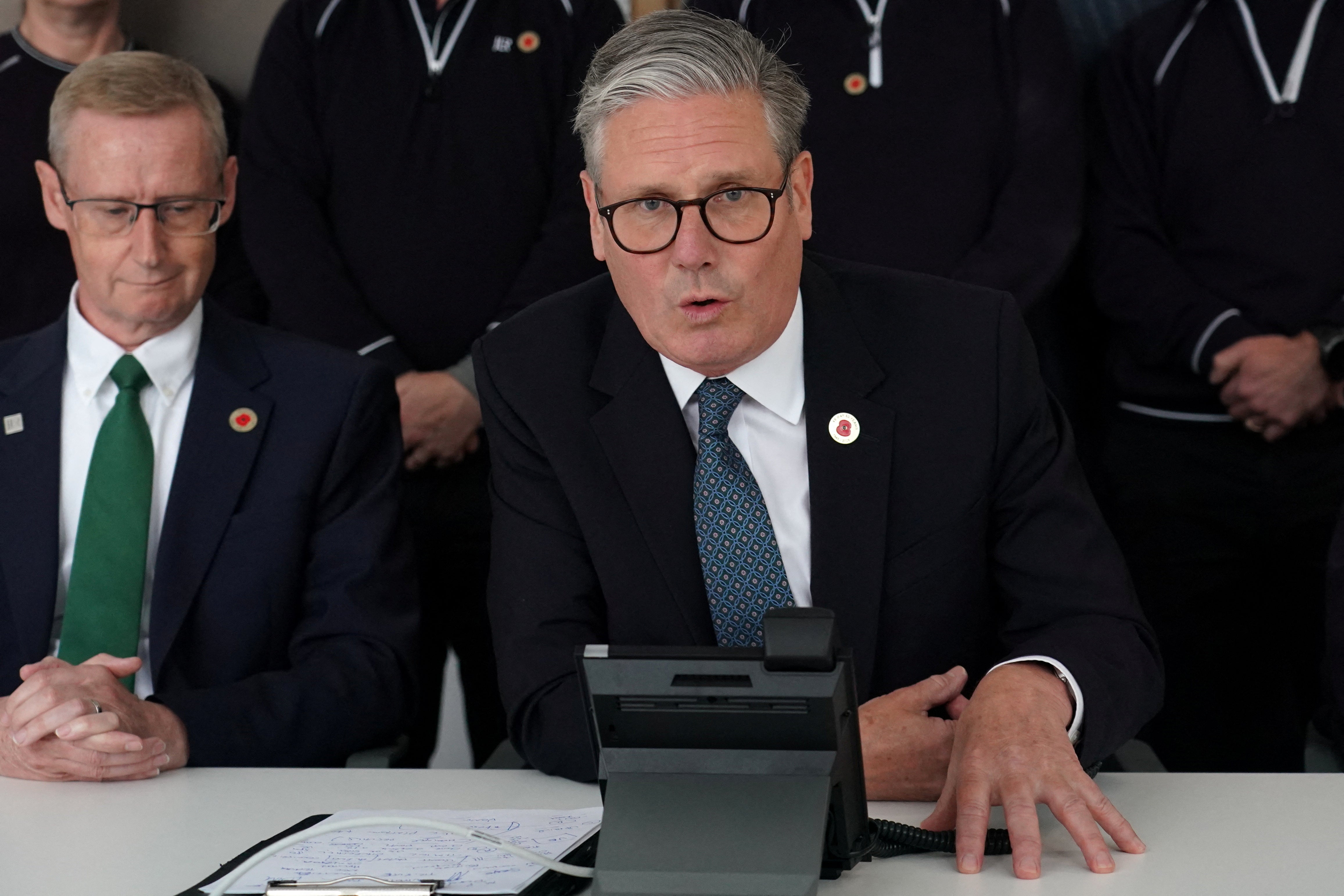The United States and the United Kingdom have agreed to increase market access for American exports while easing some tariffs for Britons, President Donald Trump announced Thursday in the first official trade agreement since imposing global tariffs.
In a brief morning press conference, Trump, from the Oval Office, and Prime Minister Keir Starmer, via telephone, said the U.K. would reduce “red tape,” streamlining U.S. exports such as beef, ethanol and other products.
"It's opening up the country that we really didn't have the kind of access to,” Trump said of one of the U.S.’s closest allies and largest trading partners.
In return, the U.S. will ease the 25 percent tariff on vehicles to 10 percent for 100,000 vehicles and eliminate steel tariffs.
“It’s so good for both countries and we’ll also receive new market access for American chemicals, machinery and many other industrial products that weren’t allowed and they’ll end up getting products that they’ll be able to price, and they like them better,” Trump said on Thursday.
The president initially teased news of the deal on Truth Social, calling it a “full and comprehensive one” that would “cement” the U.S. and U.K. relationship.
However, details of the deal are still relatively unclear– the finalized version will be released in the coming weeks.
Regardless of the details, the announcement relieved pressure on the U.S. stock market with the Dow, S&P 500 and Nasdaq composite opening higher on Thursday morning.
Although Trump did not impose additional tariffs on the U.K. back in April, he did leave a 10 percent global tariff in place and subjected it to the 25 percent tariff on aluminum, steel and vehicle imports.
That 10 percent baseline tariff will remain.

Trump’s initial announcement sent global markets into a tailspin, worrying consumers and investors about rising prices and potential inflation. The president temporarily paused the tariffs to allow countries to make deals.
Trump has long complained about countries “ripping off” the United States with large trade deficits. But unlike countries like China, the United States has an almost negligible trade deficit with the U.K.
The administration previously wanted that the U.K. to allow hormone-fed beef.
As part of the deal, the U.K. agreed to slash tariffs on beef import and exports. However, the British government said it would not weaken U.K. food standards, meaning hormone-fed beef will not be permitted.
Over the phone on Thursday, Starmer boasted about the trade deal, stressing the importance of the U.K. – U.S. relationship on the same day Europe marked the anniversary of the Allied victory in World War II.
“To be able to announce this great deal on the same deal 80 years forward, almost at the same hour and as we were 80 years ago with the U.K. and the U.S. standing side by side, I think is incredibly important,” Starmer said.

Thursday’s deal is the first of others which Trump claimed are currently in the works.
Commerce Secretary Howard Lutnick touted that the deal will create at least $5 billion in opportunity for U.S. exports.
But, Trump’s promise of a “major” trade deal between the U.S. and the U.K. landed somewhat flat with economists, who said the vague details seemed unlikely to shift either country’s economy.
Paul Ashworth, the chief North America economists at Capital Economics, wrote that the deal was a “rush to demonstrate progress on ‘deals’” as a form of desperation.
However, he contended, “that is still good news.”
“Along with the push to get trade talks with China underway too this weekend, this rush to demonstrate progress on ‘deals’ reveals a rising desperation within the administration to roll back tariffs before they hit GDP growth and inflation,” Ashworth said.
Allan Monks, the Chief U.K. Economist at J.P. Morgan, said the scope of the deal looked “limited” and the economic impact for the U.K. “is likely to be very small.”
Other economists observed that the deal was extremely specific to the U.K. and does not reflect how other trade deals may play out.
James Knightley, Chief International Economist at ING, praised the deal to the Wall Street Journal, saying it “offers hope” to consumers that there can be a scaling back of tariffs.
But ultimately, the deal is “clearly not going to be a framework for other countries to follow because the U.K. is in a very special situation in that it’s one of the few countries that runs a pretty neutral trade position.”
Trump’s trade team will hold their first meetings with their Chinese counterparts in Switzerland this weekend. He has put tariffs of 145 percent on Chinese goods, leading to warnings of empty shelves in shops, while Beijing has retaliated with 125 percent tariffs on some U.S. imports.
Eric Garcia contributed to this report
Chicago-born Robert Prevost appointed 267th Pope
Trump pulls U.S. attorney nominee after pushback from GOP Senators
Trump and Starmer agree historic UK-US trade deal with tariffs slashed for Britain
Cash-strapped Bureau of Prisons freezes some hiring to 'avoid more extreme measures,' director says
Jon Voight says Trump movie tariffs could stop Hollywood from becoming ‘like Detroit’
UK-US trade deal live: Trump slashes tariffs on steel and cars in historic agreement







